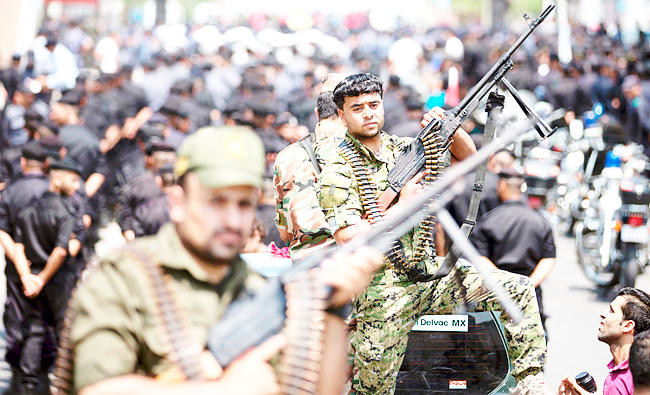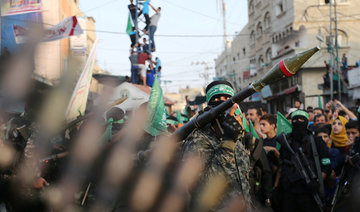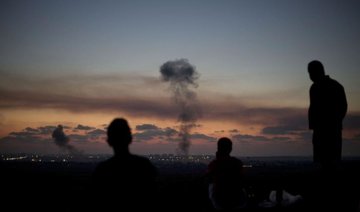LONDON: The EU’s top court opted to keep Palestinian group Hamas on the EU terrorism blacklist on Wednesday.
Judges at the European Court of Justice (ECJ) overruled the General Court’s view of 2014 that the Council of the EU had insufficient evidence to maintain asset freezes and travel bans on Hamas.
The lower court had found that the listing was based on media and Internet reports rather than decisions by a “competent authority.” But the ECJ said such decisions were not required for groups to stay on the list, only for their initial listing.
Experts offered mixed opinions on what the decision might mean. Scott Lucas, professor of international politics at the University of Birmingham, told Arab News that “on the face of it, the decision is based on a legal interpretation but there is a wider political context around this. The political environment today is very concerned about extremists. Terrorism is higher up on the agenda than it was in 2014.”
Lucas said that should the General Court not decide to review the ruling in the near future, this move “would contextualize Hamas as ‘terrorists’ and set the political tone for the EU going forward.”
The professor added that he would be “interested to see if the UK creates its own ruling on Hamas following its divorce from the EU in the coming years.”
Tally Helfont, director of the Foreign Policy Research Institute’s Programme on the Middle East, said that Hamas has not taken any actions that would warrant its removal from the EU terrorism blacklist.
She told Arab News: “Daily activities in Gaza are evidence of this. What’s more, the recent amendment of Hamas’ charter seems to have brought no substantive change to the militant group’s activities, amounting to little more than a poorly received PR stunt.”
EU keeps Hamas on terror blacklist
EU keeps Hamas on terror blacklist

Israel says intercepted two projectiles fired from central Gaza

- The military said it has intercepted several rockets fired from northern Gaza in recent days
JERUSALEM: Israel’s military said two projectiles were fired from Gaza on Wednesday in the first minutes of the new year, one of which was intercepted while the other landed in an open area.
Alert sirens sounded around midnight (2200 GMT) in the western Negev, the Israeli military said, and “two projectiles were identified crossing from the central Gaza Strip into Israeli territory.”
“One projectile was successfully intercepted and the second projectile fell in an open area,” the army said on Telegram.
The military said it has intercepted several rockets fired from northern Gaza in recent days.
Since October, Israeli operations in Gaza have focused on the north, with officials saying their land and air offensive aims to prevent Hamas from regrouping.
The Gaza war was triggered by the unprecedented Hamas-led October 7, 2023, attack on Israel, which resulted in 1,208 deaths — mostly civilians — according to an AFP tally of Israeli official figures.
Israel’s retaliatory military campaign has killed more than 45,500 people in Gaza, a majority of them civilians, according to figures from the Hamas-run territory’s health ministry.
The UN considers those figures reliable.
New year hope reigns in a Damascus freed from Assad

- More than half a million people died in the 13-year civil war as the country split into different regions controlled by various warring parties
DAMASCUS: Umayyad Square in Damascus hummed to the throngs of people brandishing “revolution” flags as Syria saw in the new year with “hope” following 13 years of civil war.
Gunshots rang out from Mount Qasioun overlooking the capital where hundreds of people gazed up at fireworks, an AFP reporter at the square saw.
It was the first new year’s celebration without an Assad in power for more than 50 years after the fall of Bashar Assad in December.
“Long live Syria, Assad has fallen,” shouted some children.
Despite the revelry, soldiers patrolled the streets of Damascus, less than a month after Assad’s rapid demise.
The green, white and black “revolution” flag with its three red stars flies all over the capital.
Such a sight — the symbol of the Syrian people’s uprising against the Assad dynasty’s iron-fisted rule — was unthinkable a month ago.
The revolutionary song “Lift your head, you are a free Syrian” by Syrian singer Assala Nasri rang out loud on Umayyad Square.
“Every year, we aged suddenly by 10 years,” taxi driver Qassem Al-Qassem, 34, told AFP in reference to the tough living conditions in a country whose economy collapsed under Assad.
“But with the fall of regime, all our fears have dissipated,” he added.
“Now I have a lot of hope. But all we want now is peace.”
More than half a million people died in the 13-year civil war as the country split into different regions controlled by various warring parties.
Many families are still waiting for news of loved ones who disappeared under Assad’s rule, during which time tens of thousands of prisoners disappeared.
“I hope that Syria in 2025 will be non-denominational, pluralist, for everyone, without exception,” said Havan Mohammad, a Kurdish student from the northeast studying pharmacy in the capital.
Ocalan: PKK chief held in solitary on Turkish prison island

- A Marxist-inspired group, the PKK is considered a terror organization by Turkiye, the United States, the European Union and most of Turkiye’s Western allies
ISTANBUL: Abdullah Ocalan, the jailed founder of Kurdish militant group the PKK, is hailed by many Kurds as an icon, but within wider Turkish society many see him as a terrorist who deserves to die.
On Saturday, Ocalan, who has been held in solitary confinement in Turkiye since 1999, received his first political visit in nearly a decade amid signs of a tentative thaw in relations with the Turkish government.
The move came two months after the leader of the far-right MHP, a close ally of President Recep Tayyip Erdogan, offered Ocalan an unprecedented olive branch if he would publicly renounce terror.
In a message sent back with his visitors, two lawmakers from the pro-Kurd opposition DEM party, Ocalan — the man who embodies the decades-long Kurdish rebellion against the Turkish government — said he was “ready” to embrace efforts to end the conflict.
“I am ready to take the necessary positive steps and make the call,” said the 75-year-old former guerrilla, who also received his first family visit in four years on October 23.
During that visit, Ocalan said he had the necessary clout to shift the Kurdish question “from an arena of conflict and violence to one of law and politics.”
Ankara’s tentative bid to reopen dialogue nearly a decade after peace efforts collapsed comes amid a major regional adjustment following the ouster of Syria’s Bashar Assad.
Ocalan founded the PKK — the Kurdistan Workers’ Party — in 1978. It spearheaded a brutal insurgency that has killed tens of thousands in its fight for independence and, more recently, broader autonomy in Turkiye’s mostly Kurdish southeast.
A Marxist-inspired group, the PKK is considered a terror organization by Turkiye, the United States, the European Union and most of Turkiye’s Western allies.
After years on the run, Ocalan was arrested on February 15, 1999 in Kenya following a Hollywood-style operation by Turkish security forces.
He was sentenced to death, but escaped the gallows when Turkiye abolished capital punishment in 2004. He has since been held in an isolation cell on Imrali island in the Sea of Marmara.
For many Kurds, he is hero they call “Apo” (uncle). But Turks often call him “bebek katili” (baby killer) for his ruthless tactics, including the bombing of civilian targets.
Tentative moves to resolve Turkiye’s “Kurdish problem” began in 2008. Several years later, Ocalan got involved in the first unofficial peace talks, approved when Erdogan was premier.
Seen as the world’s largest stateless people, Kurds were left without a country when the Ottoman Empire collapsed after World War I.
Although most live in Turkiye, where they make up around a fifth of the population, the Kurds are also spread across Syria, Iraq and Iran.
For hard-line nationalists who support the post-Ottoman idea of “Turkishness,” the Kurds simply do not exist.
And not all Kurds back the ideas, let alone the methods, of the PKK.
Led by Hakan Fidan, Erdogan’s spy chief turned foreign minister, the talks raised hopes of ending the insurgency in favor of an equitable solution for Kurdish rights within Turkiye’s borders.
But they collapsed in July 2015, reigniting one of the deadliest chapters in the conflict.
After a suicide attack on pro-Kurdish demonstrators attributed to Islamic State (IS) group jihadists in October 2015, the PKK accused Ankara of collaborating with IS and resumed its violence with a vengeance.
Turkiye’s widescale use of combat drones has pushed most Kurdish fighters into Iraq and Syria, where Ankara has continued raids.
The government has defended its de facto silencing of Ocalan by saying he failed to convince the PKK of the need for peace, raising doubts about how much sway he has over the group.
Ocalan was born on April 4, 1948, one of six siblings in a mixed Turkish-Kurdish peasant family in Omerli village, in Turkiye’s southeast. His mother tongue is Turkish.
He became a left-wing activist while studying politics at university in Ankara, and did his first stint in prison in 1972.
He set up the PKK six years later, then spent years on the run, launching the movement’s armed struggle in 1984.
Taking refuge in Syria, he led the fight from there, causing friction between Damascus and Ankara.
Forced out in 1998 and with the net closing in, Ocalan raced from Russia to Italy to Greece in search of a haven, ending up at the Greek consulate in Kenya, where US agents got wind of his presence and tipped off ally Ankara.
Lured into a vehicle and told he would be flown to the Netherlands, Ocalan was instead handed over to Turkish military commandos and flown home on a private plane to face trial.
A new year dawns on a Middle East torn by conflict and change

- The last year was a dramatic one in the Middle East, bringing calamity to some and hope to others
DAMASCUS: In Damascus, the streets were buzzing with excitement Tuesday as Syrians welcomed in a new year that seemed to many to bring a promise of a brighter future after the unexpected fall of Bashar Assad’s government weeks earlier.
While Syrians in the capital looked forward to a new beginning after the ousting of Assad, the mood was more somber along Beirut’s Mediterranean promenade, where residents shared cautious hopes for the new year, reflecting on a country still reeling from war and ongoing crises.
War-weary Palestinians in Gaza who lost their homes and loved ones in 2024 saw little hope that 2025 would bring an end to their suffering.
The last year was a dramatic one in the Middle East, bringing calamity to some and hope to others. Across the region, it felt foolish to many to attempt to predict what the next year might bring.
In Damascus, Abir Homsi said she is optimistic about a future for her country that would include peace, security and freedom of expression and would bring Syrian communities previously divided by battle lines back together.
“We will return to how we once were, when people loved each other, celebrated together whether it is Ramadan or Christmas or any other holiday — no restricted areas for anyone,” she said.
But for many, the new year and new reality carried with it reminders of the painful years that came before.
Abdulrahman Al-Habib, from the eastern Syrian city of Deir Ezzor, had come to Damascus in hopes of finding relatives who disappeared after being arrested under Assad’s rule. He was at the capital’s Marjeh Square, where relatives of the missing have taken to posting photos of their loved ones in search of any clue to their whereabouts.
“We hope that in the new year, our status will be better ... and peace will prevail in the whole Arab world,” he said.
In Lebanon, a tenuous ceasefire brought a halt to fighting between Israel and the Hezbollah militant group a little over a month ago. The country battered by years of economic collapse, political instability and a series of calamities since 2019, continues to grapple with uncertainty, but the truce has brought at least a temporary return to normal life.
Some families flocked to the Mzaar Ski Resort in the mountains northeast of Beirut on Tuesday to enjoy the day in the snow even though the resort had not officially opened.
“What happened and what’s still happening in the region, especially in Lebanon recently, has been very painful,” said Youssef Haddad, who came to ski with his family. “We have great hope that everything will get better.”
On Beirut’s seaside corniche, Mohammad Mohammad from the village of Marwahin in southern Lebanon was strolling with his three children.
“I hope peace and love prevail next year, but it feels like more (challenges) await us,” he said.
Mohammad was among the tens of thousands displaced during more than a year of conflict between Hezbollah and Israel. Now living in Jadra, a town that was also bombarded during the conflict, he awaits the end of a 60-day period, after which the Israeli army is required to withdraw under the conditions of a French and US-brokered ceasefire.
“Our village was completely destroyed,” Mohammad said. His family would spend a quiet evening at home, he said. This year “was very hard on us. I hope 2025 is better than all the years that passed.”
In Gaza, where the war between Hamas and Israel has killed more than 45,500 Palestinians, brought massive destruction and displaced most of the enclave’s population, few saw cause for optimism in the new year.
“The year 2024 was one of the worst years for all Palestinian people. It was a year of hunger, displacement, suffering and poverty,” said Nour Abu Obaid, a displaced woman from northern Gaza.
Obaid, whose 10-year-old child was killed in a strike in the so-called “humanitarian zone” in Muwasi, said she didn’t expect anything good in 2025. “The world is dead,” she said. “We do not expect anything, we expect the worst.”
The war was sparked by the Oct. 7, 2023 Hamas-led attack on southern Israel in which militants killed around 1,200 people and abducted some 250 others.
Ismail Salih, who lost his home and livelihood, expressed hopes for an end to the war in 2025 so that Gaza’s people can start rebuilding their lives.
The year that passed “was all war and all destruction,” he said. “Our homes are gone, our trees are gone, our livelihood is lost.”
In the coming year, Salih said he hopes that Palestinians can “live like the rest of the people of the world, in security, reassurance and peace.”
Two migrants die off Tunisia, 17 others rescued: National Guard

- Tunisia is a key departure point for irregular migrants seeking to reach Europe. Each year, tens of thousands of people attempt the perilous Mediterranean crossing
TUNIS: Two Tunisian migrants, one of them a five-year-old child, died after their makeshift boat broke down off the country's northern coast, with 17 others rescued, the National Guard has said.
One body was found aboard the vessel, while the dead child was recovered from the water, the National Guard said in a statement Monday.
It said maritime units had responded to a distress call Sunday "about a damaged vessel out at sea that began taking on water", rescuing 17 out of 19 passengers.
"Five were rescued while fighting for their lives after they jumped off the boat," it added.
Four people linked to organising the crossing attempt were arrested, the statement said.
Tunisia is a key departure point for irregular migrants seeking to reach Europe. Each year, tens of thousands of people attempt the perilous Mediterranean crossing.
Italy, whose Lampedusa island is only 150 kilometres (90 miles) from Tunisia, is often their first port of call.
The crossing has seen a spate of recent shipwrecks, exacerbated by bad weather.
On December 18, at least 20 migrants from sub-Saharan Africa died in a shipwreck off the city of Sfax, with five others missing.
On December 12, the coastguard rescued 27 African migrants near Jebeniana, north of Sfax, but 15 were reported dead or missing.
In late October, 15 unidentified bodies were recovered off Mahdia, another key departure point.
And in September, 36 migrants -- 20 Tunisians and 16 Egyptians -- were rescued from a stranded boat near Nabeul.
Since the beginning of the year, the Tunisian human rights group FTDES has counted "between 600 and 700" migrants killed or missing in shipwrecks off Tunisia. More than 1,300 migrants died or disappeared in 2023.
Tunisia is grappling with a number of economic woes, marked by high inflation, unemployment, and sluggish growth.





















